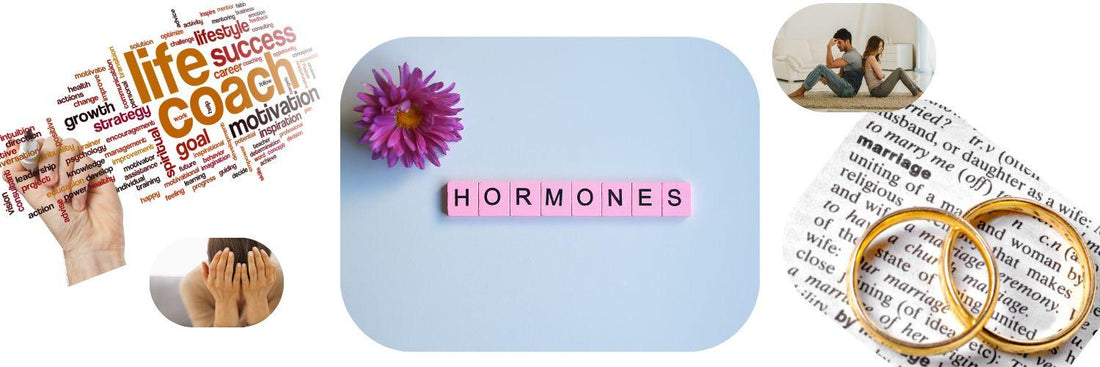1. Introduction
Women's health is an intricate puzzle composed of interlocking pieces such as hormones, work, life, and family. Each piece affects the others, creating a complex picture that influences physical well-being, mental health, and overall life satisfaction. Understanding how these elements interact is crucial for women seeking to maintain balance and harmony in their lives.
This comprehensive guide delves into the common issues affecting women's health, emphasizing how each aspect—hormonal changes, professional life, personal relationships, and family responsibilities—interconnects. We will explore whether relationship counseling, online marriage counseling, or engaging a life coach—including insights on how to find a life coach—is the most beneficial path forward.
2. Women's Health: A Complex Puzzle of Hormones, Work, Life, and Family
Understanding the Puzzle
Imagine women's health as a jigsaw puzzle where each piece represents a different facet of life:
- Hormones: The biochemical messengers influencing physical and emotional states.
- Work: Professional responsibilities and career ambitions.
- Life: Personal growth, self-identity, and leisure activities.
- Family: Relationships with partners, children, and extended family.
Each piece is interconnected. A shift in one area can impact the others, making it essential to approach women's health holistically.
Interconnected Impacts:
- Hormonal fluctuations can affect mood and energy levels, influencing work performance and family interactions.
- Work stress can lead to burnout, affecting hormonal balance and personal relationships.
- Family responsibilities can limit personal time, impacting self-care and professional development.
- Life transitions like marriage, childbirth, or relocation can alter family dynamics and work-life balance.
Recognizing this interplay helps in identifying the root causes of health issues and selecting appropriate support mechanisms.
3. Common Issues Affecting Women's Health
3.1 Hormonal Imbalances
3.1.1 Impact:
Hormonal fluctuations are a natural part of a woman's life, occurring during menstrual cycles, pregnancy, postpartum periods, and menopause. However, imbalances can lead to:
- Physical Symptoms: Fatigue, weight gain or loss, hot flashes, night sweats, irregular periods, and changes in libido.
- Emotional and Mental Health Issues: Mood swings, irritability, depression, anxiety, and difficulty concentrating.
- Long-Term Health Risks: Osteoporosis, cardiovascular disease, and metabolic disorders.
These symptoms can disrupt daily life, strain relationships, and impair work performance.
3.1.2 Relief Options:
- Medical Intervention:
- Endocrinologist Consultation: A specialist can diagnose hormonal disorders through blood tests and physical examinations.
- Treatment Plans: May include hormone replacement therapy, medication, lifestyle changes, and dietary adjustments.
- Therapist:
- Role: Helps address emotional and psychological effects of hormonal imbalances.
- Benefits: Provides coping strategies for mood swings, anxiety, and depression.
- Life Coach vs Therapist:
- Life Coach: Focuses on actionable steps to manage lifestyle factors affecting hormones, such as stress management, nutrition, and exercise.
- Therapist: Addresses underlying psychological issues and offers treatment for mental health conditions.
- Recommendation: Begin with a medical evaluation to rule out underlying conditions. Combine therapy for emotional support with life coaching for lifestyle adjustments.
3.2. Stress and Anxiety
3.2.1 Impact:
Women often juggle multiple roles—professional, familial, social—which can lead to chronic stress and anxiety:
- Physical Effects: Headaches, muscle tension, digestive issues, and sleep disturbances.
- Mental Health: Increased risk of anxiety disorders, depression, and burnout.
- Behavioral Changes: Irritability, restlessness, decreased productivity, and withdrawal from social activities.
3.2.2 Relief Options:
- Life Coach:
- Role: Assists in identifying stress triggers and developing personalized stress management techniques.
- Benefits: Improves time management, prioritizes self-care, and enhances resilience.
- Spiritual Life Coach:
- Role: Incorporates spiritual practices to promote inner peace and balance.
- Benefits: Utilizes meditation, mindfulness, and energy healing to reduce stress.
- Therapist:
- Role: Provides clinical interventions for stress-related mental health issues.
- Benefits: Employs cognitive-behavioral therapy (CBT) and other modalities to alter negative thought patterns.
- Recommendation: For daily stress management, a life coach or spiritual life coach can be beneficial. If stress leads to anxiety disorders or depression, seeking a therapist is crucial.
3.3 Relationship Problems
3.3.1 Impact:
Healthy relationships are vital for emotional well-being. Issues can manifest as:
- Communication Breakdown: Misunderstandings and lack of effective dialogue.
- Emotional Distance: Feeling unsupported or disconnected from a partner.
- Conflict Escalation: Frequent arguments and unresolved disputes.
These problems can contribute to stress, anxiety, and depression, affecting other life areas.
3.3.2 Relief Options:
- Relationship Counseling:
- Role: Aims to improve communication and resolve conflicts in romantic relationships, whether dating or cohabiting.
- Benefits: Teaches active listening, empathy, and problem-solving skills.
- Online Marriage Counseling:
- Role: Offers marital therapy through virtual platforms, ideal for busy schedules or long-distance situations.
- Benefits: Provides convenience, privacy, and access to a wider range of specialists.
- Recommendation: For couples experiencing significant challenges, relationship counseling or marriage counseling online can facilitate healing and growth. Individual life coaching may support personal development that enhances relationship dynamics.
3.4 Work-Life Balance
3.4.1 Impact:
Balancing career ambitions with personal life can lead to:
- Burnout: Chronic fatigue, cynicism, and reduced efficacy at work.
- Health Issues: Increased risk of chronic conditions like hypertension and heart disease.
- Personal Life Strain: Neglecting relationships and personal interests.
3.4.2 Relief Options:
- Life Coach:
- Role: Helps set professional goals while maintaining personal well-being.
- Benefits: Provides strategies for delegation, time management, and setting boundaries.
- Therapist:
- Role: Addresses underlying issues such as perfectionism, fear of failure, or work-related stress disorders.
- Benefits: Offers therapeutic techniques to manage stress and improve mental health.
- Recommendation: A life coach is ideal for practical strategies to enhance work-life harmony. A therapist is recommended if work stress is causing significant mental health issues.
3.5 Family Responsibilities
3.5.1 Impact:
Women often shoulder significant family responsibilities, including childcare and eldercare:
- Emotional Toll: Feelings of overwhelm, guilt, or resentment.
- Time Constraints: Limited personal time leading to self-neglect.
- Financial Pressure: Balancing caregiving with financial obligations.
3.5.2 Relief Options:
- Therapist:
- Role: Provides a safe space to express emotions and develop coping mechanisms.
- Benefits: Helps manage caregiver stress and prevent burnout.
- Life Coach:
- Role: Assists in creating actionable plans to balance family duties with personal goals.
- Benefits: Encourages setting realistic expectations and seeking support systems.
- Support Networks:
- Role: Connects with community resources or support groups.
- Benefits: Offers practical assistance and emotional solidarity.
- Recommendation: Combining therapy for emotional support with life coaching for practical planning can lead to a more balanced approach to family responsibilities.
3.6 Self-Identity and Personal Growth
3.6.1 Impact:
At different life stages, women may experience shifts in self-identity, affecting:
- Self-Esteem: Questioning self-worth and abilities.
- Life Direction: Uncertainty about career paths or personal goals.
- Fulfillment: A sense of stagnation or lack of purpose.
3.6.2 Relief Options:
- Life Coach:
- Role: Guides in exploring passions, strengths, and setting meaningful goals.
- Benefits: Empowers decision-making and fosters confidence.
- Spiritual Life Coach:
- Role: Helps align life choices with personal values and spiritual beliefs.
- Benefits: Enhances self-awareness and purpose through spiritual exploration.
- Therapist:
- Role: Addresses deep-seated issues affecting self-identity, such as past trauma.
- Benefits: Provides therapeutic interventions to rebuild self-image.
- Recommendation: A life coach or spiritual life coach is beneficial for proactive personal development. A therapist is appropriate if self-identity issues are linked to psychological trauma or mental health conditions.
4. Comparing Relief Options
4.1 Relationship Counseling vs. Marriage Counseling
Relationship Counseling:
- Scope: Suitable for couples at any relationship stage, including dating, engaged, or long-term partnerships.
- Focus Areas:
- Communication Enhancement: Improving dialogue and understanding.
- Conflict Resolution: Addressing and resolving disagreements.
- Relationship Goals: Aligning future plans and expectations.
- Benefits: Builds stronger foundations and prevents future conflicts.
Marriage Counseling:
- Scope: Specifically designed for married couples facing marital issues.
- Focus Areas:
- Marital Challenges: Infidelity, financial disagreements, parenting conflicts.
- Legal Considerations: Navigating separation or divorce if necessary.
- Online Marriage Counseling:
- Accessibility: Ideal for couples with busy schedules or in remote areas.
- Privacy and Comfort: Allows sessions from home, reducing stigma or discomfort.
- Benefits: Provides tools to rebuild the marriage and foster long-term satisfaction.
Recommendation: Choose relationship counseling for general relationship improvements and marriage counseling for marriage-specific issues. Online options offer flexibility but ensure the counselor is qualified and the platform is secure.
4.2 Life Coach vs. Therapist
Life Coach:
- Approach: Future-focused, emphasizing goal achievement and personal development.
- Techniques: Action planning, motivational strategies, accountability partnerships.
- When to Choose:
- Personal Growth: Seeking to enhance skills or change life direction.
- Professional Development: Aiming for career advancement or transitions.
- Lifestyle Changes: Desiring improvements in health, relationships, or habits.
- How to Find a Life Coach:
- Certifications: Look for credentials from reputable coaching organizations (e.g., ICF).
- Experience: Seek coaches with expertise in your area of interest.
- Compatibility: Ensure their coaching style aligns with your personality and goals.
- Testimonials: Read reviews or request references from past clients.
Therapist:
- Approach: Past and present-focused, treating mental health conditions and emotional challenges.
- Techniques: Psychotherapy methods like CBT, psychoanalysis, EMDR, etc.
- When to Choose:
- Mental Health Issues: Depression, anxiety, PTSD, eating disorders.
- Emotional Distress: Grief, trauma, severe stress.
- Behavioral Concerns: Addiction, self-harm, destructive behaviors.
- Benefits: Provides professional diagnosis and treatment plans for psychological well-being.
Recommendation: Opt for a life coach when seeking guidance on achieving specific life goals or making lifestyle changes. Choose a therapist for mental health treatment and emotional healing. In some cases, working with both can offer comprehensive support.
5. Taking the Next Step
Assess Your Needs:
- Self-Reflection: Identify the puzzle pieces causing imbalance.
- Prioritize Issues: Determine which areas need immediate attention.
Research Options:
- Professional Qualifications: Ensure counselors or coaches are certified and experienced.
- Personal Fit: Choose someone whose approach aligns with your values and comfort level.
- Accessibility: Decide if online or in-person sessions suit your lifestyle.
Seek Professional Help:
- Initial Consultations: Take advantage of introductory sessions to assess compatibility.
- Ask Questions: Clarify their methods, success rates, and what to expect.
- Commit to the Process: Be open to change and willing to put in the effort.
6. Conclusion
Women's health, akin to a complex puzzle, requires attention to each piece to see the full picture. Hormones, work, life, and family are interconnected, and imbalances in one area can affect overall well-being. By understanding these dynamics and exploring options like relationship counseling, online marriage counseling, or engaging a life coach—including knowing how to find a life coach—you can take proactive steps toward a balanced and fulfilling life.
Remember, seeking help is a sign of strength. Whether it's adjusting lifestyle habits, improving relationships, or pursuing personal growth, the right support can empower you to assemble the pieces of your health puzzle successfully.


